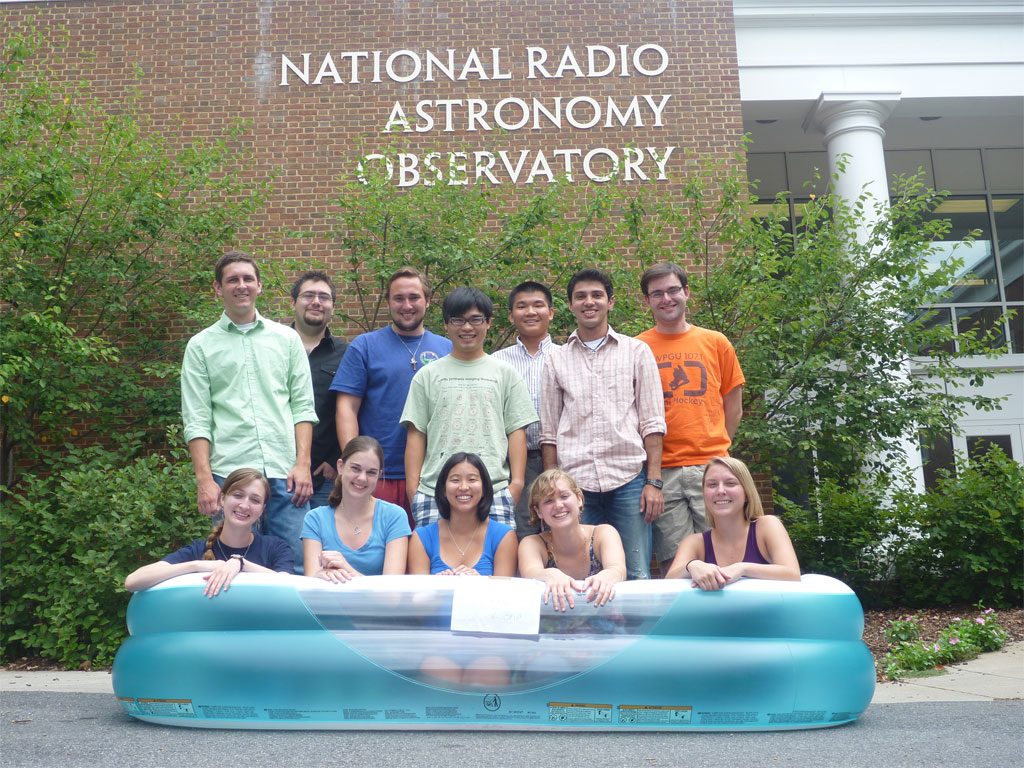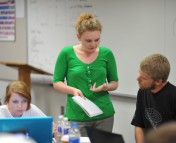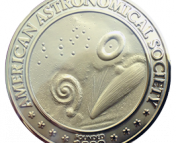If you are a sophomore or junior undergraduate, you’ve probably spent the last month watching your senior friends apply to graduate programs, jobs, and other non-academic positions. You may be thinking forward to when you fill out these same applications in the coming years. If you are considering a future in research or academia, two important parts of your application will be letters of recommendations from advisors and a statement about your previous research. One way to enhance both (and have a lot of fun in the process!) is by participating in the NSF summer REU programs. We’ve discussed these programs previously; today our focus is on applying for REUs.

The NRAO Charlottesville REU students from the summer of 2010, including the author of this post (back right, in the orange).
First, some background. The NSF Research Experience for Undergraduates program is a program designed to provide opportunities for research for rising juniors and seniors who may not have access to research opportunities at their current institutions. For 10-12 weeks, students work with an advisor on a pre-planned research project designed to be finished in this time period. In addition to research, students will take part in planned events such as a lecture series, travel to a telescope, or other department functions. At the end of the summer, students will give a 10-15 minute presentation to the other students and faculty at the REU site, in a style similar to lectures one would present at a conference.
Some of these programs are as competitive as the top graduate programs, with upwards of 200 people applying for ten or fewer positions. Don’t let this discourage you! The probability of getting into any one program might be low, but if you decide not to apply because of this, the probability immediately drops to zero (which is even lower!). By applying to multiple programs that you’re interested in, you can increase your chances of finding one that fits you dramatically. The NSF keeps an offical list of all the REU sites in all subjects: look through the list of REU sites offering positions for summer students in astronomy and physics, find a few that you are very interested in, and apply!
How to apply:
For most applications, you only need a few things, and money isn’t any of them. You will need:
1) To be a United States citizen or permanent resident. This is an NSF requirement. If you don’t have at least a green card, the NSF won’t let you partake in the REU program. But all hope is not lost! See below for other opportunities.
2) A personal statement. This 500-1000 word essay is extremely important. You don’t have much room, so make every word count. This is your only free-form response on the application, so use these words to explain why you want to spend your summer at the REU and why you are the ideal candidate for this position. After reading your personal statement, you want the committee to have a reaction something like this. Don’t tell a story about how you were fascinated by the stars when you were seven years old: stories like that don’t tell the committee anything much about you and your present abilities. Instead, discuss outreach or classroom activities you participated in which show your interests in a field, and explain how these are related to the type of research you may participate in at the REU. Your personal statement should be tailored to each school: form letters will be obvious and not looked upon favorably by the committee. Moreover, it’s worth mentioning that some sites give preference to students who do not have access to significant research opportunities at their home institution, so if this is true for you, be sure to mention it!
3) Letters of recommendation. Most sites require two or three letters. Don’t wait until the last minute! Find people who know you well in a scientific setting (your mom shouldn’t write you a letter) and can speak about your scientific prowess and why you would be a good fit for the REU program in question. Provide your letter-writers two weeks advance notice at the bare minimum, or preferably longer. Be sure to write them a nice thank you letter after the deadline!
4) Transcripts. Some sites require official transcripts, while others will accept an unofficial transcript. Your school might require a few days/a few dollars to send out an official transcript, so don’t wait until the last minute to finish this part of your application. See what is required, and collect official transcripts in plenty of time to meet the deadlines.
5) A CV/Resume. Consider this a dry run for grad school applications. There are lots of sites that offer information on the subject. A good strategy here is to look at lots of CVs (a quick Google search will lead you to nearly any faculty member’s CV) and look at what they have in common.
6) To fill out the application by the deadline. This is key! Stay organized through the month of January so you aren’t rushing to finish at the last minute.
Then wait! Most sites will respond after about one month, near the first of March, at which time you will have 1-2 weeks to make your decision. All REU sites will require decisions by the same date, typically around the middle of March. Sites typically keep a short waitlist of students in case they have fewer students accept than they anticipate. If you haven’t heard from some programs you applied to by early March you may want to contact the program heads to see if you may still have a chance to be accepted off a waitlist. If you are selected, congratulations! Enjoy the experience. If you aren’t, you still have options, which we will discuss below.
Q&A
To how many sites should I apply?
Great question! The answer to this is unique to you. Applications are free, but this doesn’t mean you should apply to every possible program. Apply to the programs that you are legitimately interested in. Talk to any friends you have that participated in the program previously or attend the institution in question. If you have questions about the program before deciding to apply, email the head of the program and get your answers straight from the source. Remember, an important factor in being accepted into a particular REU is luck, since so few students are taken from a large pool of applications, but you can minimize your own personal variance by applying to multiple programs that you’re interested in.
What if I don’t get into any programs?
Fear not. There are other options for you to consider. The American Astronomical Society (AAS) keeps a list of other summer opportunities that you might consider, but be advised that undergraduates are not eligible for every program on the list. If none of these interest you, you may still be able to organize research on your own. Talk to faculty in your department and ask if they have any summer projects in which you could get involved. These are great because they could extend into the fall and onward, possibly leading to one or more papers. Otherwise, look at large research institutions near your school, find faculty leading projects you find interesting, and send emails asking if they have funding for you to travel to that school and work with them for the summer. Some schools also have their own organized summer research programs, which you may consider.
Where else can I get advice on applying for an REU?
This is a really fantastic question! You can find some more information by clicking here or here, talking to faculty or older students in your department, or searching on the internet for more information.
Have you participated in an REU before and have other suggestions? Are you considering applying and have other questions? If so, leave them in the comments and they may be addressed in a follow-up post!



Regarding to the eligibility for applying REU for international students, tehre are few that allow applicants to be international students as long as they are attending to an US credited university. As myself, I was accepted to NRAO’s summer internship when I was still on the F-1 student VISA.
The trick is to keep looking around online until you find one that let international students to apply
where can i find programs that accept international students?